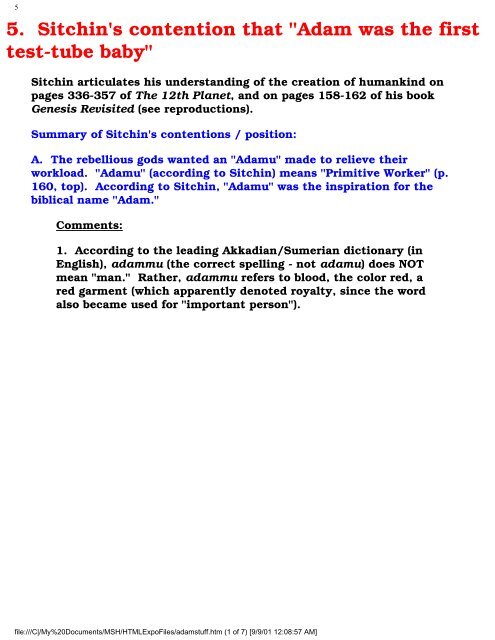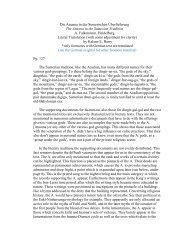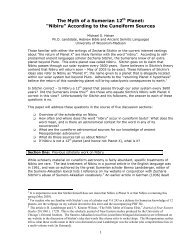5. Sitchin's contention that "Adam was the first test ... - Sitchin Is Wrong
5. Sitchin's contention that "Adam was the first test ... - Sitchin Is Wrong
5. Sitchin's contention that "Adam was the first test ... - Sitchin Is Wrong
You also want an ePaper? Increase the reach of your titles
YUMPU automatically turns print PDFs into web optimized ePapers that Google loves.
5<br />
<strong>5.</strong> <strong><strong>Sitchin</strong>'s</strong> <strong>contention</strong> <strong>that</strong> "<strong>Adam</strong> <strong>was</strong> <strong>the</strong> <strong>first</strong><br />
<strong>test</strong>-tube baby"<br />
<strong>Sitchin</strong> articulates his understanding of <strong>the</strong> creation of humankind on<br />
pages 336-357 of The 12th Planet, and on pages 158-162 of his book<br />
Genesis Revisited (see reproductions).<br />
Summary of <strong><strong>Sitchin</strong>'s</strong> <strong>contention</strong>s / position:<br />
A. The rebellious gods wanted an "<strong>Adam</strong>u" made to relieve <strong>the</strong>ir<br />
workload. "<strong>Adam</strong>u" (according to <strong>Sitchin</strong>) means "Primitive Worker" (p.<br />
160, top). According to <strong>Sitchin</strong>, "<strong>Adam</strong>u" <strong>was</strong> <strong>the</strong> inspiration for <strong>the</strong><br />
biblical name "<strong>Adam</strong>."<br />
Comments:<br />
1. According to <strong>the</strong> leading Akkadian/Sumerian dictionary (in<br />
English), adammu (<strong>the</strong> correct spelling - not adamu) does NOT<br />
mean "man." Ra<strong>the</strong>r, adammu refers to blood, <strong>the</strong> color red, a<br />
red garment (which apparently denoted royalty, since <strong>the</strong> word<br />
also became used for "important person").<br />
file:///C|/My%20Documents/MSH/HTMLExpoFiles/adamstuff.htm (1 of 7) [9/9/01 12:08:57 AM]
5<br />
file:///C|/My%20Documents/MSH/HTMLExpoFiles/adamstuff.htm (2 of 7) [9/9/01 12:08:57 AM]
5<br />
2. The word for "man" in Sumerian is not "<strong>Adam</strong>u" (as <strong>Sitchin</strong><br />
himself notes elsewhere). The Akkadian word for "man" is<br />
awilu(m)<br />
3. The texts <strong>Sitchin</strong> quotes <strong>that</strong> appear to be using "<strong>Adam</strong>u" as<br />
<strong>the</strong> primeval man ei<strong>the</strong>r have "LU" (Sumerian) or awilu<br />
(Akkadian), not "<strong>Adam</strong>u" (cf. <strong>the</strong> examples from Millard and<br />
Lambert, Atrahasis: The Babylonian Story fo <strong>the</strong> Flood, pp.<br />
54ff., whom <strong>Sitchin</strong> refers to as "<strong>the</strong> leading experts" on <strong>the</strong><br />
relevant Akkadian texts).<br />
file:///C|/My%20Documents/MSH/HTMLExpoFiles/adamstuff.htm (3 of 7) [9/9/01 12:08:57 AM]
5<br />
B. As noted above, elsewhere on page 161 of Genesis Revisited, <strong>Sitchin</strong><br />
(correctly) notes <strong>that</strong> <strong>the</strong> word for "man" is not "<strong>Adam</strong>u," but LU<br />
(Sumerian) and awilu (Akkadian). Awilu can mean "slave" or "laborer,"<br />
and so <strong><strong>Sitchin</strong>'s</strong> translation "primitive worker" (when rendering awilu,<br />
not adammu) is legitimate. Never<strong>the</strong>less, it is obvious <strong>Sitchin</strong> wants to<br />
connect "<strong>Adam</strong>u" (and so, <strong>Adam</strong>) with "primitive worker."<br />
Comments:<br />
The goal of this false equation is to lead <strong>the</strong> reader to <strong>the</strong> idea<br />
<strong>that</strong> <strong>the</strong> biblical word "<strong>Adam</strong>" also has <strong>the</strong> meaning "primitive<br />
worker" or "slave" of <strong>the</strong> gods, and so convince <strong>the</strong> reader <strong>that</strong><br />
<strong>the</strong> Hebrew Bible actually has <strong>Adam</strong> being created for <strong>the</strong> same<br />
reasons as <strong>the</strong> Sumero-Akkadian story. This is turn shows<br />
literary dependence (as opposed to a common core religious<br />
belief in <strong>the</strong> ANE) in <strong>the</strong> minds of <strong><strong>Sitchin</strong>'s</strong> readers. Nei<strong>the</strong>r idea<br />
is accurate. The Hebrew Bible has no indication <strong>that</strong> humans<br />
were designed to be slaves for <strong>the</strong> gods (in fact, before <strong>the</strong> Fall in<br />
Genesis 3, <strong>the</strong>ir work <strong>was</strong> without hardship of any kind). The<br />
Hebrew Bible's independent articulation of <strong>the</strong> common ANE<br />
idea <strong>that</strong> humanity <strong>was</strong> supernaturally created is shown by (1)<br />
<strong>the</strong> ABSENCE of <strong>the</strong> slave motif; (2) <strong>the</strong> incorporation of o<strong>the</strong>r<br />
ANE ideas (cf. Egyptian and Ugaritic) not found in <strong>the</strong> Sumero-<br />
Akkadian versions; (3) completely innovative and unique<br />
elements in <strong>the</strong> story.<br />
C. <strong><strong>Sitchin</strong>'s</strong> "<strong>Adam</strong>u" <strong>was</strong> allegedly made from an already existing<br />
hominid, upon whom <strong>was</strong> placed <strong>the</strong> divine "image" (cf. p. 160, Genesis<br />
Revisited). <strong>Sitchin</strong> fur<strong>the</strong>r states <strong>that</strong>, "<strong>the</strong> term 'image' in <strong>the</strong> Sumerian<br />
text is repeated intact in <strong>the</strong> biblical text."<br />
Comments:<br />
1. There is no reference to <strong>the</strong> divine "image" in <strong>the</strong> Sumerian<br />
and Akkadian texts. This is a totally contrived and agendadriven<br />
"translation."<br />
2. Even if <strong>the</strong> word "image" WAS in <strong>the</strong>se texts, <strong>the</strong><br />
interpretation of humanity beign derived from a genetically<br />
"upgraded" hominid depends on <strong><strong>Sitchin</strong>'s</strong> translations of key<br />
terms in <strong>the</strong> description of <strong>the</strong> creation of humanity.<br />
file:///C|/My%20Documents/MSH/HTMLExpoFiles/adamstuff.htm (4 of 7) [9/9/01 12:08:57 AM]
5<br />
The following summary comes from The 12th Planet,<br />
pp. 356-357).<br />
As <strong>Sitchin</strong> notes repeatedly, humankind (in <strong>the</strong> Sumerian<br />
and Akkadian stories) <strong>was</strong> created from <strong>the</strong> mixture of clay<br />
and <strong>the</strong> blood of a god. <strong>Sitchin</strong> notes <strong>that</strong> some sort of "life<br />
principle" <strong>was</strong> in <strong>the</strong> blood. He <strong>the</strong>refore interprets <strong>the</strong><br />
reference to "blood" in <strong>the</strong> Babylonian texts as "genes." He<br />
also notes <strong>that</strong> this divine substance <strong>was</strong> known as kis[ru in<br />
Akkadian, and contends it also refers to "genes." These<br />
terms, in <strong><strong>Sitchin</strong>'s</strong> mind, refer to <strong>the</strong> divine genetic material<br />
which <strong>was</strong> inserted into <strong>the</strong> egg of a female ape-woman.<br />
<strong>Sitchin</strong> sees a reference to <strong>the</strong> female egg in <strong>the</strong> Akkadian<br />
word t[it[ ("clay"), which he says comes from <strong>the</strong> Sumerian<br />
TI.IT ("<strong>that</strong> which is with life" - recall <strong>the</strong>re are no relative<br />
pronouns in Sumerian, so this derivation is doomed from<br />
<strong>the</strong> beginning). Akkadian t[it[ has a synonym, bos[ , which in<br />
turn comes from bis[a ("marsh"), which is consonantally<br />
similar to bes[a ("egg").<br />
It is a cardinal rule of linguistics and etymology <strong>that</strong><br />
one doesn't derive word meanings from ei<strong>the</strong>r roots or<br />
synonyms. Meaning is determined by CONTEXT. Roots<br />
give birth to new words which can be completely different in<br />
meaning. If <strong><strong>Sitchin</strong>'s</strong> derivational chain is correct, <strong>the</strong>n <strong>the</strong><br />
reverse should also be true - <strong>that</strong> female eggs have<br />
something to do with marshes, which in turn have<br />
something to do with mud or clay. This is simply a string of<br />
non-sequiturs <strong>that</strong> ignores diachronic and synchronic word<br />
study and <strong>the</strong> importance of context for word usage.<br />
<strong><strong>Sitchin</strong>'s</strong> logic is akin to saying something like <strong>the</strong><br />
English word "extraterrestrial" has a synonym, "alien,"<br />
which is consonantally similar to <strong>the</strong> Canaanite word<br />
"aliyan," a title for <strong>the</strong> Canaanite god Baal. Therefore we<br />
can conclude <strong>that</strong> extraterrestrials are descendants of <strong>the</strong><br />
Canaanites, or of Baal, or were Baal worshippers. Baal's<br />
titles in <strong>the</strong> ancient semitic language of Ugarit or Phoenician<br />
have no relationship to modern ENGLISH spellings and<br />
words.<br />
This silliness aside, <strong><strong>Sitchin</strong>'s</strong> interpetation is overturned<br />
by how <strong>the</strong> BABYLONIANS used <strong>the</strong> above terms in <strong>the</strong>ir<br />
own literature. We refer again to <strong>the</strong> Akkadian<br />
file:///C|/My%20Documents/MSH/HTMLExpoFiles/adamstuff.htm (5 of 7) [9/9/01 12:08:57 AM]
5<br />
dictionary:<br />
file:///C|/My%20Documents/MSH/HTMLExpoFiles/adamstuff.htm (6 of 7) [9/9/01 12:08:57 AM]
5<br />
So is <strong>the</strong>re any relationship between <strong>the</strong> Hebrew "<strong>Adam</strong>" and<br />
<strong>the</strong> Sumerian adammu (red)?<br />
Scholars are divided on this issue, mainly because <strong>the</strong> evidence is only<br />
circumstantial, and it is unclear whe<strong>the</strong>r (in Hebrew or Akkadian) <strong>the</strong>se words are<br />
related to dam (Hebrew) or damamum (Akkadian) - <strong>the</strong> words for "blood." My<br />
guess is <strong>that</strong> <strong>the</strong>re is a relationship, and <strong>that</strong> relationship has nothing to do with<br />
blood (or genetics). As Hebrew "adam" <strong>was</strong> taken from <strong>the</strong> earth ("adamah"), so in<br />
Akkadian <strong>the</strong> earth is referred to as "adamatu" (and is RED earth - see dictionary<br />
above). "Earth" is of course conceptually related to clay (clay = watery earth),<br />
and, in <strong>the</strong> Akkadian stories, when humankind <strong>was</strong> made of mixed clay and blood,<br />
<strong>the</strong> resulting mixture could be conceived of as RED clay (adamatu).<br />
The point to recognize, though, is <strong>that</strong> <strong>the</strong> Hebrew Bible deletes any reference to<br />
blood - <strong>the</strong> life principle being "<strong>the</strong> breath of God" (Gen. 2:7) - as is <strong>the</strong> case in<br />
Egyptian creation stories.<br />
file:///C|/My%20Documents/MSH/HTMLExpoFiles/adamstuff.htm (7 of 7) [9/9/01 12:08:57 AM]




